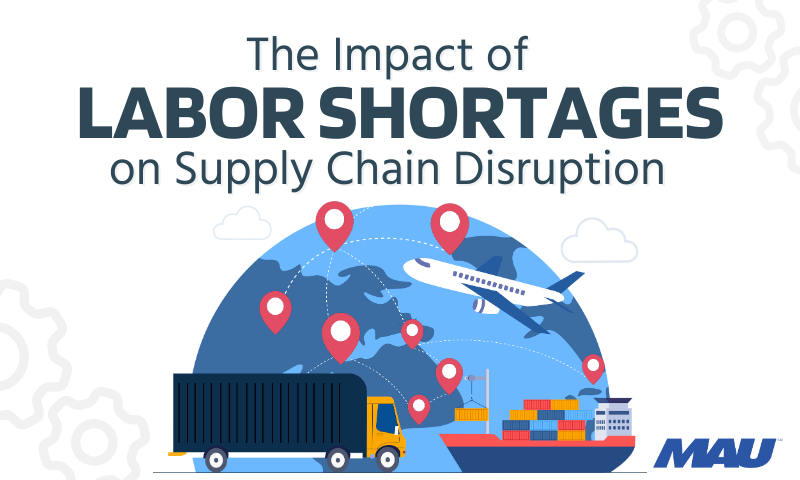The labor shortage crisis is an unprecedented challenge affecting industries worldwide. From manufacturing to transportation, the lack of skilled labor is straining supply chains, leading to inefficiencies and economic repercussions.
This blog explores the multifaceted impact of labor shortages on supply chains, focusing on the most affected sectors and potential strategies to mitigate these disruptions.
What’s Causing the Labor Shortage?
The global labor shortage is a complex issue influenced by several key factors, crucial for understanding the challenges faced by the manufacturing and supply chain industries. Demographic changes play a significant role, as older generations, such as Boomers and Gen X, begin to retire, taking their experience with them. Meanwhile, younger generations, particularly Gen Z, are less interested in traditional manual labor roles, leading to labor gaps.
Technological advancements also contribute to the labor shortage. As industries increasingly adopt automation and digital technologies, the demand for traditional manual labor roles decreases. This shift not only reduces the availability of such positions but also necessitates workers to acquire new, specialized skills. As a result, businesses encounter difficulties in recruiting and retaining personnel who can effectively navigate and manage new technologies.
Additionally, shifting workforce dynamics present challenges. There is a growing preference for remote work and flexible schedules, with many individuals seeking better work-life balance and benefits. Industries like manufacturing and transportation struggle to fill on-site roles, as these positions often offer lower pay and longer hours, making them less appealing to a generation focused on achieving work-life balance.
Direct Effects of Labor Shortages on the Supply Chain
Labor shortages disrupt the supply chain at every stage, from production to distribution. These disruptions can have cascading effects on the overall efficiency and reliability of supply chains, ultimately affecting businesses and consumers alike. Here’s how:
- Production Delays: In manufacturing, an insufficient workforce leads to slower production rates, causing backlogs and unmet demand. This can result in longer lead times for products, forcing companies to prioritize certain orders over others, and potentially leading to customer dissatisfaction and lost sales.
- Warehousing Strain: With fewer workers available, warehousing operations face inefficiencies in inventory management and order fulfillment. The lack of personnel can lead to errors in stock counts, misplaced items, and delayed responses to replenishment needs. This strain can be exacerbated during peak seasons when demand surges.
- Transportation Challenges: The transportation sector grapples with driver shortages, resulting in delayed shipments and increased shipping costs. The shortage of drivers not only delays the movement of goods but also escalates operational expenses as companies may need to offer higher wages or incentives to attract drivers. These challenges can ripple throughout the supply chain, affecting delivery schedules and cost structures.
- Impact on Customer Satisfaction: The labor shortages within the supply chain have a direct and pronounced impact on customer satisfaction. When production delays and transportation challenges lead to longer wait times for goods, customers may experience frustration and disappointment.
Sectors Most Affected
Manufacturing
Manufacturing is heavily reliant on skilled labor for production efficiency. Labor shortages result in prolonged production cycles and delays in meeting market demands, severely impacting profitability and operational stability. The manufacturing industry as a whole faced a major setback after losing roughly 1.4 million jobs during the onset of the pandemic. Since then, the industry has significantly progressed in recovery, focusing on filling job vacancies. Durable goods manufacturing has rebounded more than nondurable goods manufacturing. As of January 2024, 622,000 manufacturing job openings remain unfilled. As manufacturers struggle to meet deadlines, they may face penalties, loss of contracts, or a damaged reputation, further complicating their business operations.
Warehousing
Warehousing operations are essential for managing inventory and ensuring timely order fulfillment. Labor shortages here lead to mismanagement, increased errors, and significant delays in processing and shipping orders. As a result, companies may need to invest in automation technologies to compensate for the lack of human resources, which involves substantial upfront costs and a shift in workforce dynamics.
Transportation
The transportation sector is the backbone of the supply chain. A shortage of drivers and logistics personnel means increased delivery times, higher operational costs, and ultimately, reduced customer satisfaction. Companies may resort to alternative modes of transport or restructuring their logistics networks to minimize delays, which can introduce further complexity and risk into supply chain operations.
Strategies to Mitigate the Impact
Advanced Workforce Management Technologies
Implementing advanced workforce management technologies can optimize scheduling, enhance productivity, and ensure efficient use of available labor.
Competitive Wages and Benefits
Offering attractive wages and benefits is crucial for attracting and retaining skilled workers in the manufacturing and supply chain sectors.
Training and Upskilling Programs
Investing in training and upskilling programs helps fill gaps in specialized roles and improves overall workforce capabilities. This approach not only addresses immediate labor shortages but also prepares the workforce for future challenges.
Educational Partnerships
Establishing partnerships with educational institutions and community programs promotes careers in manufacturing and logistics, expanding the talent pool and creating a pipeline of skilled labor.
Diversified Sourcing Strategies
Diversifying sourcing strategies for labor, including workforce solution providers, Recruitment Process Outsourcing (RPO), Managed Service Providers (MPO), and professional recruitment agencies, ensures a more resilient and adaptable workforce.
The long-term implications of labor shortages on supply chains are profound. Building resilience through proactive measures is essential for sustaining operations and maintaining competitiveness.
For comprehensive insights and tailored strategies, consider partnering with MAU. With our proven expertise in staffing and outsourcing, we assist businesses in navigating labor shortages and constructing a strong, resilient supply chain. Together, we can achieve success through collaboration and mutual growth.






